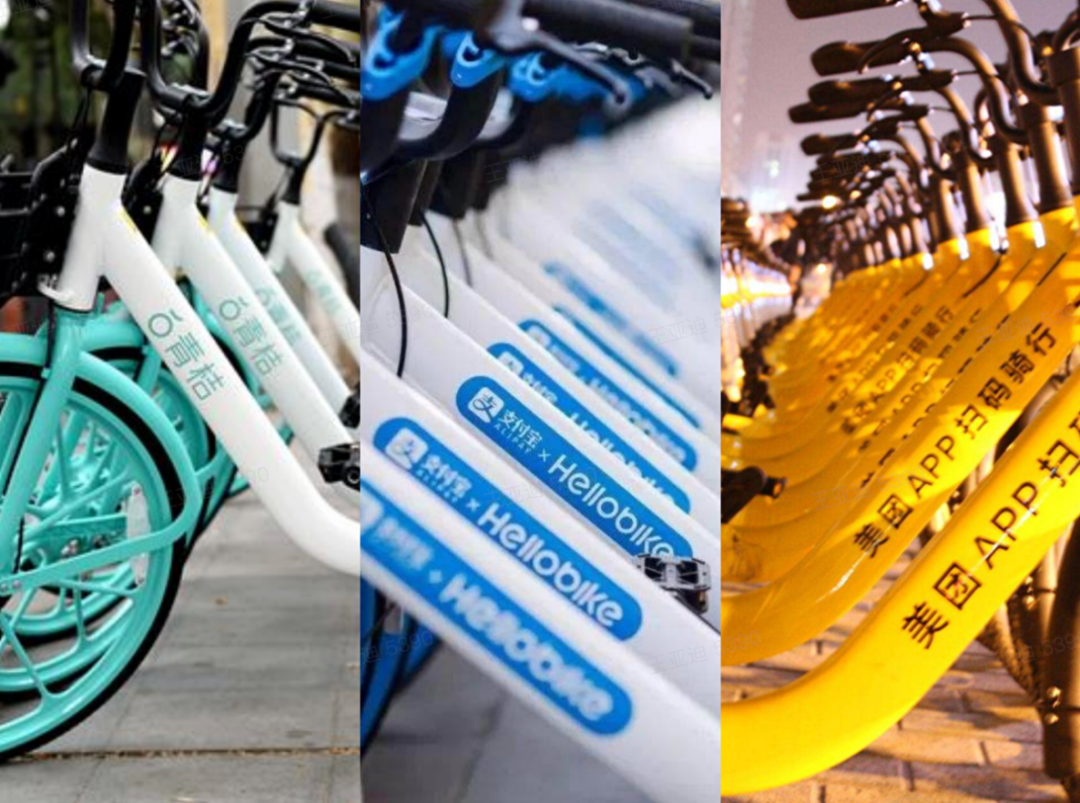Old players, new stories.
Editor’s note: This article is from the WeChat public account “Deep-echo” (ID: deep-echo), author : Tingting.
Core Points
-
Out of the sight of the crowd in the Fifth Ring, the battle for shared motorcycles is in full swing in the sinking market.
-
In the early stages of the industry’s development, various subdivision tracks have used large subsidies, which is also an important reason why shared travel is labeled as “burning money”. The madness and eagerness of capital in the early stage of entering the market gave companies the confidence to continue to burn money, accelerated the expansion of the bubble, and made it burst faster.
-
After integration, the industry has stepped out of the proxy war and turned into a arena for giants to confront each other.
From the darling of capital to the bottom of the valley to the resurgence of the wind, even though the mobile Internet venture capital boom has been repeated in the past few years, there are not many tracks that can stage such ups and downs in a few years, and shared travel is one of them.
Since this year, this track that has been bottomed in the past two years has once again ushered in a capital raise:
-
At the beginning of the year, the shared bicycle track, which has been regarded as “capital abandoned”, ushered in the news that Qingju completed a huge financing of 1 billion US dollars.
-
In September, Dida, whose core business is ride-hailing and taxis, submitted a prospectus, which is expected to become the “first share of shared travel.”
-
In October, GoFun Technology announced a Series B financing of hundreds of millions of RMB, and revealed that it might be listed on the Science and Technology Innovation Board.
-
In October, the online car-hailing brand Shouqi Car-hailing completed hundreds of millions of dollars in Series C financing.
No matter it is the shared bicycle represented by Qingju and the shared car represented by GoFun, there has been no financing news for a long time, and the online car-hailing market has also been relatively low-key in the past two years. The frequency and speed of financing are a barometer of the popularity of a track. The capital actions that have been concentrated in the shared travel industry this year have been revealed.The undercurrent surging below the water surface.
Reviewing history, the major directions of shared travel-online car-hailing, shared bicycles, and time-sharing leasing-all deduced a similar curve: around 2015, they ushered in the climax of development, which is the focus of market and capital Focus: Around 2018, due to various reasons, they fell into a trough; now, they have come to an inflection point together by coincidence.
All information points to the same result-in 2020, sharing has gone out of the trough.
Shared travel to borrow the corpse to resurrect
The shared travel market has not been so lively for a long time.
While the epidemic has severely hit many offline industries, shared travel players who rely heavily on offline and have been left out for a long time have regained the favor of capital.
Two of the most representative financing events in April were Didi’s green orange bicycle Obtaining more than 1 billion U.S. dollars in financing and GoFun’s recently completed B round of financing, which respectively mean that the two sub-tracks, shared bicycles and time-sharing leases, have regained the public view after experiencing a dormant period.
In addition, Dida Travel promotes the IPO process of Hong Kong stocks, frequent rumors of Didi’s listing, and GoFun reveals The news of the planned listing on the Science and Technology Innovation Board also indicates that the industry has entered a new and important stage.
In addition to external forces, players in the shared travel industry have also shown a more aggressive offensive attitude this year.
The change in attitude of the leading company Didi is particularly noticeable. In March of this year, Didi released its “0188” three-year plan. Under the pressure of growth, it launched a number of new businesses such as running errands, digital buses, and maps, and accelerated the development of the two-wheeler business Qingju through financing. Most notably, in order to accelerate growth, Didi even restarted large subsidies by launching the sinking brand “Flower While “Little Pig Taxi” is harvesting the market at a low price, Didi’s aggressive attitude is evident in the announcement of the launch of the 10 billion subsidy program in October.
While Didi is trying to further consolidate the market, second-tier online car-hailing brands and aggregation platforms are also preparing a collective counterattack.
T3 Travel, initiated by Changan, FAW, Dongfeng, etc., is one of the representatives of second-tier online car-hailing. It covers seven cities in its first anniversary and has accumulated 7 million registered users. In mid-August, T3 Travel announced the signing of Zhou Dongyu as the first brand spokesperson. According to public information, its goal is to achieve a market share of over 20% in each city in the layout.
The bigger variable lies in AutoNavi and Meituan, which have entered the online car-hailing market with a platform model. Since the beginning of this year, AutoNavi has continuously expanded its cooperation network with online car-hailing brands and local taxi companies, and has issued subsidies at May 1st and 11th. Meituan Taxi’s competitive attitude is even stronger, according toInterface News reported that in July, Meituan’s taxi-hailing plan increased its subsidies to users, and each order can get 20% to 30% discount, the goal is to seize more than 10% market share in mainstream cities.
In a market that has been cultivated by many forces for many years, don’t Play with the family expects further growth , Which means that territorial disputes are intensifying. Similar battles not only appear on the online car-hailing track, but also shared bicycles are not peaceful.
After the money-burning battle between ofo and Mobike came to an abrupt end, the shared bicycles formed a three-legged situation of Haro, Qingju, and Meituan, behind which stood Alibaba, Didi, and Meituan are three big and small giants. This new track that was once high hopes is now a veritable battlefield for giants.
Nowadays, the competition for shared bicycles falls more on the layout of shared motorcycles around lower-tier cities.
Beginning in March this year, Meituan launched a large-scale launch of yellow motorcycles. At the end of April, it launched the Hundred Days Campaign internally, with the goal of becoming the first in the country within this year. Didi merged its motorcycle brand Street Rabbit and Qingju, and at the same time, it continued to increase its weight. In May, it announced that it will cooperate with National Network Electric Vehicles State Grid Shima, a subsidiary of the company, signed a strategic cooperation agreement to jointly operate the shared motorcycle business.
Haro, backed by Alibaba, has always been its base in the sinking market and has the largest share of the shared motorcycle market. But with Meituan and Didi joining the game, Haro is facing severe challenges.
Out of the eyes of the crowd in the Fifth Ring Road, the battle for shared motorcycles is in full swing in the sinking market.
Compared with online car-hailing and shared bicycles, the time-sharing track that has just regained the attention of capital has not yet shown a clear competitive situation. But it is foreseeable that as the market heats up, the actions of related companies will become more frequent.
If the intensified competition between online car-hailing and shared bicycles reflects the will of the giants, then the revival of time-sharing leases really shows that good luck has returned to shared travel.
The myth rises and disappears
The lively scene of the shared travel market this year can not help but remind people of the past madness of the market.
Since 2014, the concept of sharing has become popular, and it is particularly sexy when combined with the huge urban travel demand. The online car-hailing market, with the help of capital, set off a subsidy war led by Didi and Kuaidi. Ma Huateng recalled in a speech that the losses of both parties started at 20 million yuan, and they did not dare to stop until a single-day loss of 40 million yuan. Until Didi merged quickly and acquired Uber, and the market structure gradually stabilized, this subsidy war only lasted for a while.
In the early days of the birth of time-sharing leasing, it was once in the air. Since 2015, car-sharing platforms that adopt the time-sharing lease model have emerged intensively, including SAICDownload exiangtiankai, Panda under Lifan, GoFun under Shouqi, Tuge, etc., 2017 At the beginning of the year, the number of car-sharing companies exceeded 300 at one time. At the same time, the capital was enthusiastic. The financing of car-sharing in 2017 exceeded 70 billion yuan.
Bicycle sharing is a more dramatic story. Even if a few years pass, no one will forget the Rainbow War that started in 2016. Among them, the shared list Che Ming star enterprise ofo completed five rounds of financing in 2016 alone, including the C round The amount of financing reached 130 million U.S. dollars, and three more rounds of financing were completed in 2017. The total amount of financing exceeded 2.1 billion U.S. dollars. The main investors include Ant Group and Didi Travel.
As one of the most popular industries in the past, all subdivisions of shared travel have encountered development turning points in 2018.
-
In 2018, after two vicious ride-hailing safety accidents, Didi was struggling with public opinion and turned to low-key operations. At the same time, its huge losses are hard to ignore. As of the end of 2019, the cumulative loss of Didi in the seven years since its establishment is expected to exceed 50 billion, and the feasibility of Didi’s business model is questioned.
-
In the same year, the bicycle-sharing star company ofo was caught in a thunderstorm. Its rival Mobike sold itself to Mobike in January 2019. The vigorous bicycle-sharing war ended with a feather.
-
That same year, time-sharing platforms such as Muggle Travel and Zhongguan Car-sharing went bankrupt. One year later, the car giant DaiCar2go, a car-sharing brand under Muller, officially withdrew from the Chinese market, and car-sharing has gradually become unpopular.
In five or six years, the shared travel market has experienced a cycle. The reasons behind the rise and fall of the tuyere are traceable.
In 2009, Uber was established in the United States and developed rapidly in the following years. Under the trend of “Copy to China”, the concept of shared travel was introduced into the Chinese market. At the same time, the rise of the mobile Internet wave has provided development soil for shared travel platforms based on O2O. At that time, taxis were the main transportation capacity in cities, and taxis had different service standards, low online rates, and high prices. The strong travel demand, huge market space, and the economic and environmental benefits under the shared concept packaging have attracted a large number of entrepreneurs and investors.
According to different distance requirements, it has gradually developed shared bicycles covering the last mile of travel, daily commuting, online car-hailing based on 0-50 kilometers, and time-sharing based on short trips of 50-100 kilometers. lease.
But the golden age of shared travel is not long. After 2018, the market has obviously turned cold, and capital has become more cautious about it. Myths were created and shattered too quickly, behind which was the combined effect of business model, operating environment, and capital power.
First of all, the health and rationality of the business model determines whether shared travel players can transform from “golden monsters” to companies with self-hematopoiesis and maintain healthy development.
The most obvious disadvantage of the business model is time-sharing leasing. Except for a very small number of platforms that adopt the P2P model and introduce private cars, most car-sharing players have adopted the asset-heavy model and bear a very high level of Car purchase, maintenance, insurance costs and parking costs. In addition, most domestic car-sharing platforms use new energy vehicles.Therefore, the cost of car charging is also involved.
Under the asset-heavy model, most car-sharing companies face the problems of large initial investment, long return periods, and difficult profitability. According to the calculations of “Electric Vehicle Observer”, the daily operating cost of shared cars in the industry is at least 50-60 yuan per car. According to industry sources, if you choose economical models for sharing, optimistically, at least two or three orders per car per day can barely recover the transportation. Dimension cost. In fact, most operators cannot guarantee such costs and operational efficiency, and are deeply mired in losses.
In addition, subsidies are another major factor that aggravates losses. In the early stages of the development of shared travel, in order to educate the market and increase market share, various sub-tracks have used large subsidies, which is also an important reason why shared travel is labeled as “burning money”. In the case that the profit model has not yet run through, corporate expenses are maintained by financing, and the market scale obtained by burning a lot of money does not have a solid foundation.
This is also the reason why Didi, as a star unicorn, has always been controversial. In 2018, Didi founder Cheng Wei stated in an internal letter that Didi had never made a profit since its establishment in 2012, and the official explanation was that the loss was mainly due to huge subsidies.
The madness and eagerness of capital in the early stage of entering the market gave various companies the confidence to continue to burn money, accelerated the expansion of the bubble, and made it burst faster. Shared bicycles are the most typical representative of capital growth: under the hot money, a large number of entrepreneurs enter the market, focusing on seizing the market and expanding the scale in the short term, without considering the profit model and long-term development, making the establishment of a healthy business model difficult, and ultimately difficult to sustain, ideal Heading for destruction.
Another reason why shared travel cannot be ignored is the environmental impact.
The rise of time-sharing leasing coincides with the time when the new energy vehicle industry in the domestic market took off. In September 2013, the new energy vehicle promotion plan was released, releasing an unprecedented scale of subsidies, which is one of the reasons why most shared car companies choose new energy vehicles. And for OEMs, using their new energy vehicles for time-sharing leasing is one of the means to meet the capacity of electric vehicles and meet the operating mileage requirements of the subsidy standard. Therefore, OEMs such as SAIC and Shouqi have entered the sharing of cars.
But at that time, the supporting facilities for new energy vehicles were not perfect, which added difficulty to the operation of shared car companies. By June 2019, the new energy vehicle subsidy policy was formally implemented, and the subsidy amount was almost cut in half, and the shared car industry, which is already profitable, poured cold water.
Due to various factors, shared travel has been attributed to Shenyang in the past two years.lonely. Shared travel has become popular again, but many changes have taken place in the industry that has emerged from the trough today.
Can the new story make sense?
The entire market for shared travel has revived this year. There are some objective reasons behind this that cannot be ignored.
From the perspective of the general environment, 2020 is a particularly special year.
The outbreak of the epidemic restricts the outgoing and movement of people, which inhibits the growth of the travel market in the short term, but in the long term, the epidemic affects people’s preferences for travel to a certain extent. Bicycles, online car-hailing, car rental, etc. are more private Sexual travel is more popular than public transportation. The limited incremental space for private cars under various constraints may be an important reason why shared travel has regained market attention. Shouqi Car-hailingCEO Wei Dong once publicly stated that ride-hailing and carpooling are expected to develop after the epidemic .
On the other hand, affected by multiple factors, the secondary market is particularly hot this year. With the addition of A-shares, Hong Kong stocks listing system reform and other factors, 2020 can be called the IPO year, which will provide the top shared travel companies that have been dormant for a long time. An excellent listing window period has accelerated the capitalization of shared travel.
From the perspective of the industry itself, the ups and downs of the past few years and the process of advancing in the trough has also given the shared travel industry a different approach from the previous wave.
Some players have chosen to innovate the business model and transform from heavy assets to light assets. For example, the aggregation of taxi-hailing platforms represented by Meituan and AutoNavi, their profit model is better than the traditional online car-hailing model, and attract a large number of second-tier online car-hailing brands to settle in, converging into a force that cannot be underestimated. Didi is also laying out its aggregation model. In September this year, Didi revealed that it had access to Tencent’s map aggregation ride-hailing business.
The rise of the aggregation model, to a certain extent, meansThe game logic of shared travel has changed, and many views believe that the aggregation model will be the end of shared travel. The future market trend remains to be seen. At least from the perspective of capital preferences, the light-asset and low-risk characteristics of the aggregation model are obviously more appetizing.
GoFun is also trying to transform to a light-asset model. It stated that it will pursue the goal of lightweight and platformization in the form of dealers and personal vehicles entering the network. The change in model may also be the reason why GoFun was able to successfully introduce Series B financing after a long silence.
On the other hand, the development of shared travel is closely related to the transformation of the automobile industry. With the gradual implementation of concepts such as electrification and intelligence, the possibility of optimization of shared travel economic models brought about by technology has become more convincing.
For time-sharing leasing, its development is in line with the ups and downs of the new energy vehicle industry. Since the beginning of this year, the new energy vehicle market has broken out again, subsidies have declined, and new forces in domestically produced vehicles have developed rapidly, which has provided the soil for the restart of the shared vehicle market. In addition, the inclusion of charging piles in new infrastructure and other good news also means that the future business environment of shared cars will gradually improve.
The battle of shared bicycles has gradually turned into a battle of shared motorcycles. One of the reasons behind it is that the better average turnover rate of motorcycles enables them to achieve better unit economic benefits and more independent realization of profitability. Sex.
In addition, the track is also trying to tell more new stories. For example, in June this year, Didi driverless taxis were officially launched on the road. There is hidden Didi’s future hope to improve operational efficiency and expand profitability through technology—— Although this blueprint is still a little bit distant at present.
The changes at the lower level are: After integration, the industry has stepped out of the proxy war and turned into a arena for giants to confront each other.
As a high-frequency demand for people’s daily life, travel is a necessary link to connect many scenes. Under the background of the disappearance of the mobile Internet, it is the common demand of all giants to penetrate deeper into people’s daily life. Travel must be Unable to give up the track.
Under the current competitive landscape, giants such as Alibaba, Meituan, and Didi are not giving way to each other. In the sinking market, the competition and competition between the three have been very fierce. Subsidies are still one of the key words in the shared travel market: Sui With Didi’s tens of billions of subsidies and Huaxiaozhu launched this year, the online car-hailing subsidy battle has become increasingly fierce.
However, the giants who are still eligible to stay on the court are not short of money. With the warning of the subsidy war, the focus of the new round of competition has shifted to model innovation and efficiency improvement.
After all, when burning moneyThe generation has ended, and players who are still playing new matches with the old methods may not be able to write a new ending.






